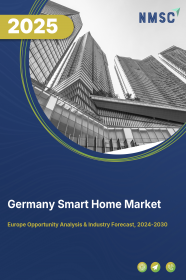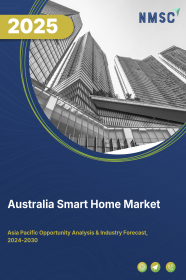
Germany Smart Home Market by Product Type (Smart Lighting, Smart Home Security & Surveillance, Smart Entertainment, and Smart Appliances), by Communication Protocol (Wi-Fi, Zigbee, Z-Wave, Bluetooth, and Thread), by Smart Home Hubs (Standalone Hubs and Built-in Hubs), by Voice Assistants Integration (Amazon Alexa, Google Assistant, Apple Siri, and Others) – Opportunity Analysis and Industry Forecast, 2024–2030
Industry: Retail and Consumer | Publish Date: 15-Feb-2025 | No of Pages: 140 | No. of Tables: 104 | No. of Figures: 69 | Format: PDF | Report Code : RC2271
US Tariff Impact on Germany Smart Home Market
Trump Tariffs Are Reshaping Global Business
Germany Smart Home Market Overview
The Germany Smart Home Market size was valued at USD 3.42 billion in 2023, and is predicted to reach USD 11.75 billion by 2030, at a CAGR of 19.3% from 2024 to 2030. A smart home, also known as a connected home, is a residence equipped with advanced technology and automated systems that enable the monitoring and control of various household devices, appliances, and security features through a centralized network. These smart devices is managed remotely and often respond to voice commands or present schedules, enhancing convenience, energy efficiency, and security for residents. Typical components found in connected homes include smart thermostats, lighting systems, security cameras, voice-activated assistants, and a variety of interconnected devices designed to improve the overall quality of life at home.
Increasing Disposable Income is Driving the Market Growth
The growing demand for smart home products in Germany is fuelled by the rising disposable income of its citizens, consequently bolstering the market. In the second quarter of 2023, Germany witnessed an increase in total disposable income from approximately USD 615 billion in the first quarter to USD 628 billion. As household incomes escalate, consumers gain greater financial capability to invest in connected home technologies and systems. With connected home solutions offering convenience, energy efficiency, and heightened security, they become more attainable to a wider demographic with increased disposable incomes.
The affordability of these technologies encourages consumers to embrace connected home devices, such as smart thermostats, connected appliances, and home automation systems, to enhance their overall quality of life. This trend contributes significantly to the expansion and growth of the smart home market in Germany as consumers aspire to reap the benefits of an increasingly interconnected and intelligent living environment.
Strategic Efforts in Building Smart Grids Boosts the Germany Smart Home Market Growth
Germany is actively engaged in building smarter energy grids, commonly referred to as smart grids, to enhance energy distribution efficiency and reliability. According to The Federal Network Agency, the country is projected to approve 2,800 kilometers of high-voltage lines by the end of 2024 and 4,400 kilometers by the end of 2025.
Smart homes play a pivotal role in this strategic initiative by interfacing with these grids, exchanging valuable energy consumption data, and receiving signals to adjust their energy usage patterns. For instance, during periods of peak demand, a connected home might curtail energy usage in non-essential areas to mitigate the risk of power outages. This integration fosters more efficient energy management and delivers a more stable and dependable home energy supply. Additionally, Germany leads Western Europe in connected home adoption, boasting an impressive 40% adoption rate.
Security and Data Privacy Acts as Obstacles to the Market Growth
Concerns surrounding security and data privacy pose significant barriers to the expansion of the smart home market. The interconnected nature of smart devices, including thermostats, cameras, and door locks, renders them vulnerable to hacking, jeopardizing the privacy and safety of residents. This vulnerability often arises from weak or easily guessable passwords and insufficient Wi-Fi network security measures.
Exploiting these weaknesses, hackers gain unauthorized access, potentially commandeering devices or accessing sensitive information. To address these risks, proactive homeowners must prioritize robust password practices, regularly update device firmware, and fortify their home networks to mitigate the threat of cyber-attacks and shield their connected homes from potential breaches.
Integration of Blockchain Technology into Smart Home Devices Presents Lucrative Opportunity for Market Expansion
Recognized for its robust security features and transparency, blockchain technology offers significant potential to strengthen the security and privacy of smart home systems. This is achieved through the encryption and secure storage of sensitive connected home data, empowering users with control over their information and reducing the risk of unauthorized access. Blockchain validates device identities, ensuring only trusted devices interact within the connected home network, and simplifies operations through tamper-proof smart contracts.
Moreover, it decentralizes device control, minimizing vulnerabilities and enabling transparent management of access control and permissions. The incorporation of blockchain into connected homes not only enhances security and privacy but also fosters a safer and more confidential environment. As a result, it is poised to stimulate considerable growth opportunities within the market.
Competitive Landscape
Several market players operating in the Germany smart home industry include Honeywell International, Inc., Schneider Electric, ABB Ltd, Amazon, Gira, Samsung, LG Electronics, Loxone Electronics GmbH, Somfy, Shelly
Germany Smart Home Market Key Segments
By Product Type
-
Smart Lighting
-
Smart Bulbs
-
Smart Light Strips
-
Smart Switches
-
-
Smart Home Security and Surveillance
-
Smart Cameras
-
Video Doorbells
-
Smart Locks
-
Security System
-
-
Smart Entertainment
-
Smart TVs
-
Smart Speakers
-
Streaming Devices
-
-
Smart Appliances
-
Smart Refrigerators
-
Smart Ovens
-
Smart Washing Machines
-
Smart Dishwashers
-
Smart Home HVAC Management
-
Other Smart Appliances
-
By Communication Protocol
-
Wi-Fi
-
Zigbee
-
Z-wave
-
Bluetooth
-
Thread
By Smart Home Hubs
-
Standalone Hubs
-
Built-in Hubs
By Voice Assistants Integration
-
Amazon Alexa
-
Google Assistant
-
Apple Siri
-
Others
By Smart Home Compatibility with Smartphones
-
iOS
-
Android
By Installation
-
DIY Installation
-
Professional Installation
By Sales Channel
-
Online Retailers
-
Retailers
REPORT SCOPE AND SEGMENTATION:
|
Parameters |
Details |
|
Market Size in 2023 |
USD 3.42 Billion |
|
Revenue Forecast in 2030 |
USD 11.75 Billion |
|
Growth Rate |
CAGR of 19.3% from 2024 to 2030 |
|
Analysis Period |
2023–2030 |
|
Base Year Considered |
2023 |
|
Forecast Period |
2024–2030 |
|
Market Size Estimation |
Billion (USD) |
|
Growth Factors |
|
|
Companies Profiled |
10 |
|
Market Share |
Available for 10 companies |
|
Customization Scope |
Free customization (equivalent up to 80 working hours of analysts) after purchase. Addition or alteration to country, regional, and segment scope. |
|
Pricing and Purchase Options |
Avail customized purchase options to meet your exact research needs. |
KEY PLAYERS
-
Honeywell International, Inc.
-
Schneider Electric
-
ABB Ltd
-
Amazon
-
Gira
-
Samsung
-
LG Electronics
-
Loxone Electronics GmbH
-
Somfy
-
Shelly

















 Speak to Our Analyst
Speak to Our Analyst




















